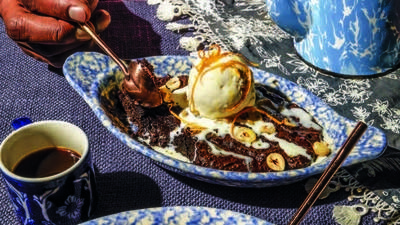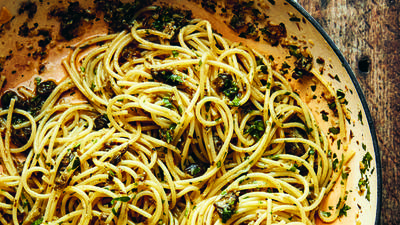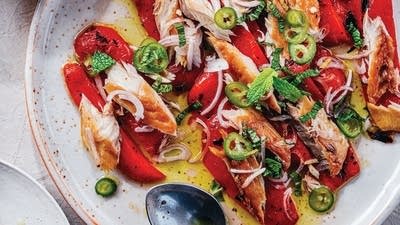
Wendell Pierce is an actor and Tony Award-winning producer. He is also the founder of a new grocery store chain, Sterling Farms, which he hopes will provide fresh food and produce to underserved New Orleans-area residents.
Lynne Rossetto Kasper: Actors do restaurants and they do clubs, but actors don’t do grocery store chains.
Wendell Pierce: They do now.
LRK: How did you come to this?
 Wendell Pierce
Wendell Pierce
WP: I’m from New Orleans -- born and raised -- and when Katrina happened, my neighborhood was in some of the deepest part of the flooding, Pontchartrain Park. It was a neighborhood that was like Mayberry. Our parents fought long and hard during the ugly time of segregated New Orleans and there was one place separate-but-equal that African-Americans in the '50s could purchase homes. It turned out to be an incubator of talent. There’s a golf course, multi-denominational churches, Southern University of New Orleans. It was just idyllic, but it was destroyed.
Basically I put a call out to action to everybody in my generation to say we owe it to our parents to go back and rebuild. We did that. We started it and we’re in the middle of it now. We created our own development corporation. But then I looked around and I said, “Man, the commercial districts aren’t coming back.”
As I did more research, I started to realize that New Orleans was populated with food deserts and underserved communities where people didn’t have access to fresh produce and fresh foods. When I saw that, I talked to my partners and said, “Let’s start a grocery store. Let’s start a grocery store chain.” That’s how Sterling Farms, which is the name of my grocery store, was born.
LRK: You just opened the first one a short time ago.
WP: Yes, it’s the flagship. We opened several weeks ago and it’s been wonderful -- the response in the community of people saying, “I was waiting for something to come to the neighborhood.” It’s been great.
It’s in Marrero, which is just outside of New Orleans. It validated what I knew was there: pent-up demand. We hop in the car and go to the grocery store all the time. For a lot of people, that’s hopping on a bus, having to walk or having to go a little farther because they don’t have one in their neighborhood. That shouldn’t happen in America. So we see those neighborhoods as emerging markets instead of depressed areas. It’s proving to be true.
LRK: You once said that there were 16,000 customers for every grocery store in New Orleans. Does that guarantee that Sterling Farms is going to be viable?
WP: There is no guarantee when you are trying to build a business. But we have access to a large portion of people and we are willing to compete for their business. We know we have to earn their trust and earn their interest. We have to make our store their neighborhood grocery destination.
The one thing that I always remembered was shopping for groceries -- as we say in New Orleans, “making groceries” -- with my mother on a Friday night. It was a ritual to go there. It was like a wonderland for a kid, “Oh I want this, I want that, let’s get that.” Seeing the men and the women getting off work -- they had a little bar and restaurant in this place -- and knowing the fishmonger, knowing the butchers and having our favorite cashier. It was the equivalent of a town square. That neighborhood grocery is something that we take for granted; we don’t realize it until we lose it and until our culture is challenged the way New Orleans was challenged 7 years ago.
It is great to see the faces of people coming back. I literally had a woman cry. I mean, what businessman can say, “I had a woman come into my store and say, ‘Can I speak to you?’ She walked outside because she didn’t want to be seen and she welled up with emotion. ‘Thank you so much.’” That meant everything to me.
People in what are considered underserved communities have shown their loyalty to brands, stores and products through American industry by making an effort to get to their store, to get to their brand. It takes a little effort on their part to go there. All they ask is that we, as American industry, come to their communities. We stood on the sideline saying, “Uh, that’s a little too much risk.” Where other companies see risk, I see reward.
The greatest opportunity is not only to do well, but to do good; the two can co-exist.
Before you go...
Each week, The Splendid Table brings you stories that expand your world view, inspire you to try something new, and show how food connects us all. We rely on your generous support. For as little as $5 a month, you can have a lasting impact on The Splendid Table. And, when you donate, you’ll join a community of like-minded individuals who love good food, good conversation, and kitchen companionship. Show your love for The Splendid Table with a gift today.
Thank you for your support.
Donate today for as little as $5.00 a month. Your gift only takes a few minutes and has a lasting impact on The Splendid Table and you'll be welcomed into The Splendid Table Co-op.




